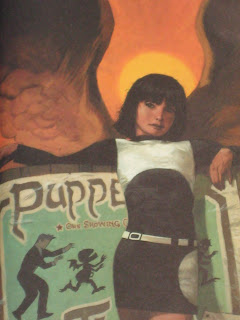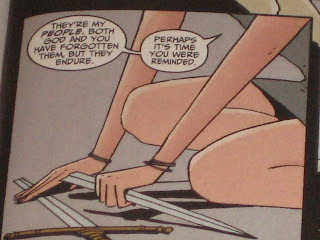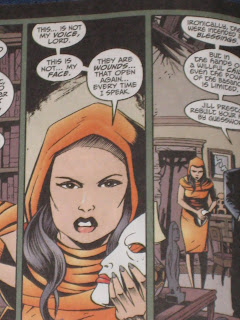When I finished watching this the first time, I was incoherent and could only manage a Ten-like triple-what.
Second First Impressions
Before I go in depth, I don't really like blogging about two part episodes. They're evil with eviler cliffhangers and evil half-stories. So it's rather like trying to evaluate a book you haven't actually read yet, and I always feel like whatever I end up writing is just shallow, shallow, shallow. But here goes.
I was proud of myself for avoiding spoilers for the most part. Still, I was not expecting the sheer unpredictable-ness of the story itself.
The Doctor dying before the first ten minutes? What the heck. And for some reason, probably because of Mark Sheppard's affinity for villains, I was expecting Delaware III to be a bad guy -- but then he wasn't! I also wasn't expecting Rory and Amy to be keeping house together while the Doctor is swanning off in balloons, gadding about under lady's dresses, and generally having the most ridiculous adventures in the history of ever.
So yes. I felt like the beginning had put me all off center because I was expecting everyone to be in the TARDIS all nice and proper instead of. Well.
Separated.
So that was interesting and new. I mean, series 2 started with newly regenerated Ten and Rose. Series 3, 4, and 5 Rose is all gone, but at least the Doctor is still in his TARDIS, which is more than can be said for Future!Eleven -- because, where is Future!Eleven's TARDIS? I mean, don't get me wrong -- he looked quite dashing on the hood of his red car but it's not his transportation of choice...is it?
And he knew that Amy saw those creature-things. Could see it in his eyes. And he knew the astronaut was coming.
And the Impossible Astronaut is impossible not because it came from a lake, but because the astronaut is a child in a man's suit.
I'm guessing.
But really, the beginning and the rest of the episode really demonstrated Matt Smith's acting ability I thought. I kept on thinking as I was watching it the first time -- this is off. This isn't like proper Eleven. He's got a diary! Not even Ten started keeping a diary. And then he was always looking so old and sad.

And he tipped his hat -- got his tenses all wrong:
A lot more happens in 1969 than anyone remembers. Human beings. I thought I'd never get done saving you.And of course a lot more happens because there's aliens buggering about that make people forget them if they're not looking at them! Then there's the parallel language that appeared in the first angel episode of the fifth season--except it was in the present tense, not the past: "I'll never be done saving you."
I doubt I'd have caught it on a first viewing if I hadn't spent most of yesterday evening and night having a Doctor Who marathon.
Character Development
Since this is the first time in the new series where all the people are the same (Eleven, Rory, and Amy), I was concerned that there'd be either stalled or ignored character development. But when Future!Eleven dies, Rory says,
There's a boat. If we're going to do this, let's do it properly.
And I can't really imagine pre-Roman Rory saying that at all. So it was nice that his character remained developed.
Then the bit in the TARDIS where Eleven is borderline paranoid about everybody and just wants to ship them off back home.

Conflict! Tension! Stakes!
And then, there was the look on River's face when he chose to trust Amy over her. Poor, poor River.
Her little monologue gave those episodes in the library new, emotional punch:
When I first met the doctor, a long long time ago, he knew about me. Think about that. Impressionable young girl, suddenly this man just drops out of the sky, and he's clever and mad and wonderful and knows every last thing about her. Imagine what that does to a girl. Trouble is--it's all back to front. My past is his future. We're traveling in opposite directions. Every time we meet, I know him more, he knows me less. I live for the days that I see him. But I know that every time I do, we'll be one step further away. The day is coming when I'll look into that man's eyes - my doctor - and he won't have the slightest idea who I am. And I think it's going to kill me.
Which is just even more compounded by the look on Rory's face and how he's making these connections between River and Amy and my god.
Tragic.
I also can't help but wonder how Amy using a gun will change their relationship. It'll be interesting to see if the Writers-That-Be will mess with the usual Doctor/Companion relationship that has been sort of defined in the previous series, particular in season 4 with Donna and Ten, where she basically told him he needed a companion to keep himself human, to keep himself from going too far (in fact, "Turn Left" was basically an entire episode about the importance of the companions in the Doctor's life).
Now though -- it's Amy who's gone too far -- who is, in fact, acting a little bit like Ambrose from series 5 -- so, it'll be interesting how or how far they'll tweak the typical Doctor/Companion relationship in that respect (though I can't blame them if they don't decide to be ultra-bold with it...it is, after all, one of the most defining aspects of the show).
And what's character development without a bit parallelism?

Symmetry of the oh-my-god-i-thought-you-were-dead-but-you're-not-not-really-how-can-this-be-poke.
The Kid.
The first words we hear from the kid are:
I'm scared, Mr. President. I'm scared of the space man.
And of course everybody thinks the "space man" is the Impossible Astronaut that Killed our Beloved Eleven from the Future.
Eleven, who doesn't know about the astronaut-intent-upon-his-death, believes that the girl has told the president everything he needs to know, and he just isn't listening. Hmm.
But then it turns out that the kid is the astronaut -- unless the thing in the astronaut took her inside...but that seems an odd method of kidnapping.
I can't help but wonder if the Space Man is actually the Doctor. I mean, Donna was always calling him Space Boy. And why else would the astronaut kill the Doctor?
But that doesn't make any sense. The timing is all wrong because the child was talking on the phone to the president before the Doctor came, and the dialogue and actions don't match up if there were some wibbly-wobbly timey-wimey moments at work.
So maybe it is just something similar to what happened in the library episodes...vashta-narade-like creatures eating people in space suits.
Cause and Effect, or, the Curse of the Headache-Inducing Nature of Time Travel
Okay. So. After the Doctor is killed but before they meet him in his-his present, they all agree that the Doctor wanted them to do something, that he still needed them. Then they seemed to agree, on the TARDIS, that they were going to save him.
But then River told Amy that they couldn't stop the astronaut in '69 because then the inciting event in 2011 wouldn't happen, thus creating a paradox.
I wonder, when Matt Smith decides it's time or whoever else decides, will keep this ending -- or if this will manage to re-write itself somehow, cause and effect be damned to davey jones locker.
Amy Pregnant
wut.
See that. I'm so disappointed I can't even bother to spell my indignation properly.
Dear yoda help us, I swear to god. What is up with the pregnancy storylines? I mean -- Fringe, Stargate, ergh! BIRTH CONTROL people.
I'm hoping it's not going to be /just/ a pregnancy storyline. I'm hoping it's not going to incredibly dull and melodramatic, like these things typically are. I'm hoping she's not pregnant at all, though she seemed rather certain (I'm hoping that since River and Amy were both sick after seeing the monstery forget-me aliens, she's just...assuming she is). I can't really imagine Rory not being more protective of her if she was...he seems to be the type (but in an adorable kind of way).
Unless he doesn't know either.
Grr.
Assorted Bits of Awesome
You know, the Future!Eleven prologues his upcoming death, funeral, and wake with this:
I've been running. Faster than I've ever run. And I've been running my whole life. Now it's time for me to stop. And tonight, I'm going to need you all with me.
When I heard it in the trailer, I thought it was a bit generic. I mean, the Doctor running (running, in and of itself, in its various contexts and definitions) is -- pardon the pun -- a running theme in the show, but in context with the entire episode, this sounds rather specific. I wonder if the show is going to dip into some Classic Who.
These are the times when I curse my continued procrastination to watch Classic Who.
Geek fail.
The forget-me-aliens -- when they first appeared, they seemed to be quite threatening. Imposing, even. But then, when River ran into them in those old tunnels, they reminded me of rats and that's not an imposing image at all (though, it was frightening how Rory and River would see them, and, though they're still literally gasping with terror, still say, all's clear and all's well and it's like oh-my-god).
Though that would explain why the Old Tunnels were old and nobody knew about them. I've bet the forget-me-aliens have been there for just as long, making everybody forget about them and the tunnels and their little knock-off Tardis.
I wonder if they built the one in "The Lodger" too...
I wonder why they're so interested in the Doctor and him knowing all the things he must and mustn't know.
The Doctor: [regarding the presidents]. Lovely fellows. Two of them fancied me.That made me smile.
Delaware III: What's going on here?
Doctor: Nothing. She's just a friend.
Rory: I think he's talking about the possible alien incursion.
Falling in love/flirt, despite his trust issues.
It seems like, with the forget-me-aliens, memory is going to be another important theme, just like it was in last series. I wonder how they'll play with the idea in new and intriguing ways.

Beautiful and sad.









































